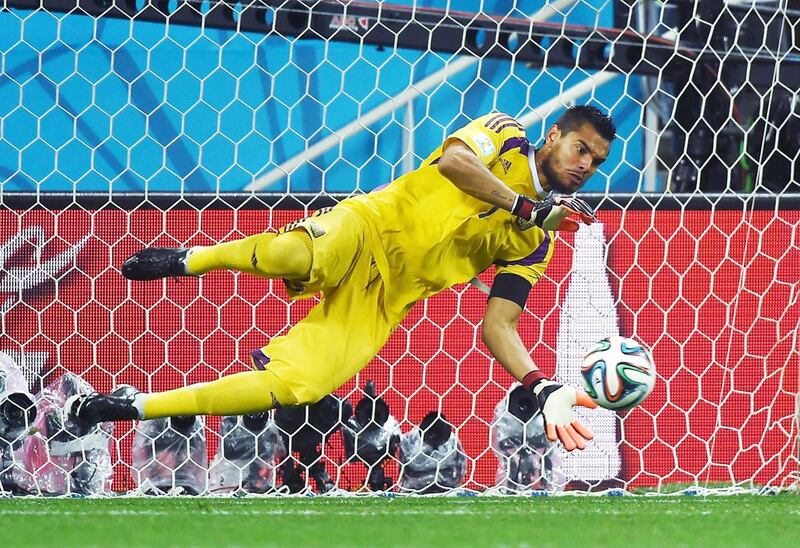One month before Argentina kicked off their World Cup, their goalkeeper, Sergio Romero, had a somewhat low-key send-off from his club.
Fewer than 8,000 came to the Stade Louis II for Monaco’s last match of the French season, and all the tributes were reserved for another keeper.
Flavio Roma, the 39-year-old Italian, made the last appearance of his professional career that May evening.
He started in the 1-1 draw at home to Bordeaux and waved goodbye on being substituted after 43 minutes – a deliberate timing by coach Claudio Ranieri so Roma could be applauded by the sparse crowd.
Romero came on as his replacement – as substitute for the loyal understudy. Monaco’s first-choice keeper through last season had been Danijel Subasic, the Croatian, whose standard was high enough to help Monaco finish second in the Ligue 1 table.
There was never much question of Romero or Roma playing regularly in anything other than the domestic cup competitions.
Romero made two league starts all term in 2013/14, when Subasic was unavailable. Sometimes, he wondered what he was doing on the Cote d’Azur. He had joined big-spending Monaco on loan from Sampdoria in Serie A last July.
As a launch pad for a World Cup season, it seemed a sound idea: Monaco were ambitious and full of established internationals.
But, following month after month of scratching around for minutes on the pitch, it looked counterproductive.
Argentina's coach, Alejandro Sabella, remained convinced Romero was his No 1 for the World Cup, however, while many other Argentines wondered how Sabella could ignore the claims of Willy Caballero, then of Malaga, now of Manchester City.
Romero kept one-and-a-half clean sheets in his two-and-a-half matches in Ligue 1. At Brazil 2014, he has not let in a goal from open play in his past six hours and 15 minutes of football.
“Heroyco” said the front page of Ole, the Argentinian sports newspaper on Thursday, picturing the fist-clenching, ecstatic Romero after the victory in the penalty shoot-out against the Netherlands that ushered his team into Sunday’s World Cup final.
Romero had saved spot kicks from Ron Vlaar and Wesley Sneijder. The Ole headline was a reference not only to his heroics but to a predecessor, Sergio Goycochea, alias “Goyco” (hence, Heroyco).
In the 1990 World Cup, where Argentina met West Germany in the final, Goycochea was responsible for more than one session of heroics in shoot-outs after he had begun the tournament as a reserve, promoted only when Nery Pumpido was injured.
Any rust that had collected on Romero from his underemployed club season ought to be well shaken off after six World Cup matches, two of which extended into extra-time. He has looked alert, and his punches clear have been a feature of Argentina’s defending.
He has been grateful, too, for the authority of Ezequiel Garay in front of him.
Garay, the centre-back, might also regard his journey to a World Cup final as somewhat tortuous. He has also known rejection, from Real Madrid, who signed him at age 21 in 2008.
Jose Mourinho never seemed to value him at better than a fourth-pick centre-half and Garay has spent the past three seasons at Benfica, from where he has just earned a transfer to Zenit Saint Petersburg.
Garay will be partnered on Sunday night by Martin Demichelis.
Demichelis has had a peculiar 12 months. Signed by Atletico Madrid last summer from Malaga, he immediately moved again – he would have been only a backup defender at Atletico – to Manchester City, where various high-profile incidents, including conceding a penalty against Barcelona in the Uefa Champions League, made him the subject of derision from City followers and many English pundits.
Demichelis, 33, came to Brazil as a reserve centre-half, but has become a first choice for Sabella.
Javier Mascherano, meanwhile, has been a superb sentry in front of Argentina's back four.
Besides the saving tackles – a brilliant one kept Arjen Robben at bay late in the game against the Dutch – and the canny interceptions, his passing from midfield has impressed.
This from the footballer whose club, Barcelona, made it clear to him when he joined them in 2010 that his distribution and vision were insufficient to gain a place in their midfield, and so they restyled Mascherano as a central defender.
He has gone some way to mastering that role, despite his short stature, but has tired of it. He has evidently enjoyed being back at anchor for his country.
Mascherano has a keen sense of what it is to be under-appreciated at what you do best. That is partly why it was Mascherano who stepped up to talk to Romero late on Wednesday night, after the whistle blew on extra time and penalties were scheduled.
“Today is when you become the hero,” he said to his keeper.
Romero later expanded on Mascherano’s message. “Javier said to me, ‘You have to make the most of this. It’s your moment after a long year of lots of criticism. You’re going to make history’.”
sports@thenational.ae
Follow us on Twitter at @SprtNationalUAE






